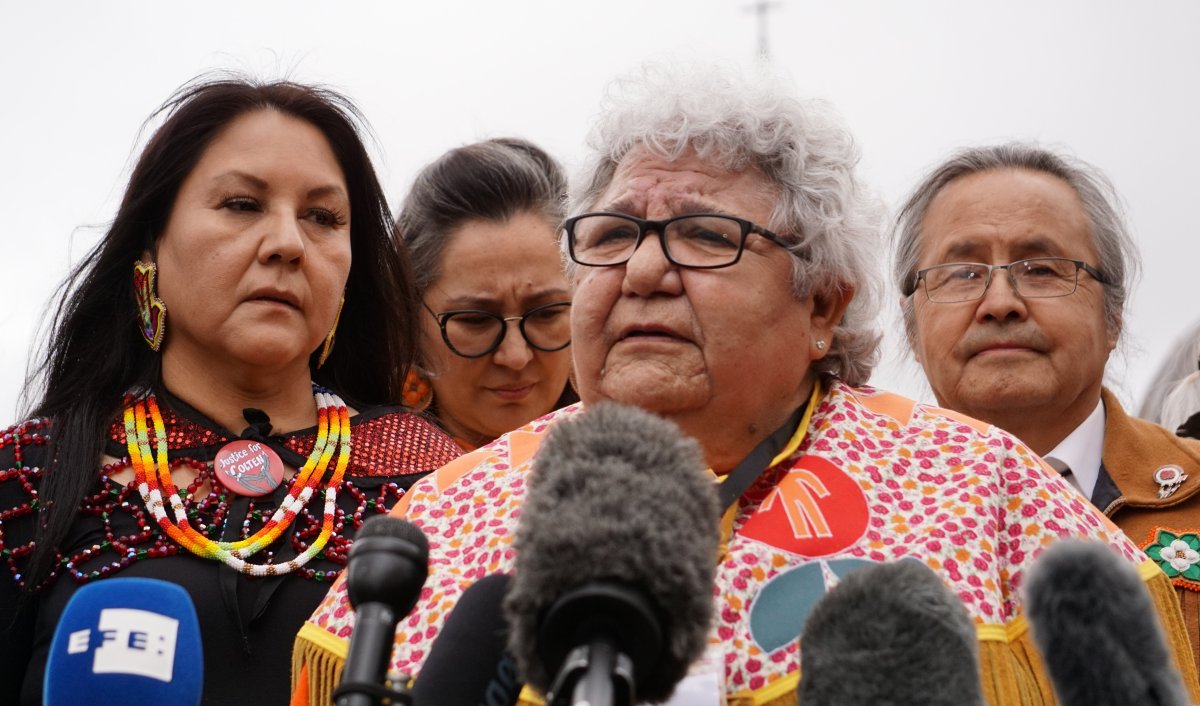Chief Marie-Anne Day Walker-Pelletier was just 26 years old when she was elected chief of Okanese First Nation in Saskatchewan.

This was in 1981 – a daunting task back then. Not only because of her age, but also because she took the reins at a time when few women sat at decision-making tables in Indigenous communities or elsewhere.
“I had to prove myself 10 times more than a man to get what we needed in our community,” Day Walker-Pelletier told Global News, her arms folded on a conference room table at her hotel less than two kilometres from the Colosseum.
“I myself underestimated myself because of how we were downplayed.”
Day Walker-Pelletier said it took a while to find her voice, but since then, she’s been a powerful force for her community, women, elders and children.
On Thursday, more than 40 years after she walked into her first chief and council meeting, she raised that voice before one of the most powerful and influential men on earth. Clad in a patterned leather cape and symbolic orange T-shirt, her message to the pontiff was clear – every child matters.
“It’s a beautiful day to honour our survivors, to honour our children and the unmarked graves,” Day Walker-Pelletier said after their audience with the Pope, flanked by her fellow delegates.
“We give you thanks for being here to support us in this journey, the beginning of a new horizon for us.”
Dozens of domestic and international journalists covered the news conference, which ran late because Pope Francis gave the delegation of 14 First Nations survivors, elders, leaders, youth and knowledge keepers an extra hour of his time.
They emerged, drumming and singing, fists held high – hopeful, they told the crowd in front of St. Peter’s Square.
The Pope has been described by delegates as receptive, sincere and thoughtful in meetings throughout the week – even hugging some of the delegates – but he has still not revealed his intentions when it comes to their requests.
The representatives are seeking a papal apology on Turtle Island for the incalculable pain and intergenerational trauma caused by state and church-sponsored residential schools. They have also asked the Holy See for all documents held by the Roman Catholic Church that pertain to the 139 institutions of assimilation operated between the 1830s and mid-1990s.
They want the pontiff to revoke centuries-old papal decrees that permitted the colonization of non-Christian Indigenous Peoples, and return some church-held properties to Indigenous Peoples.
“When you’ve lived it and you’ve seen it and you feel it and hear it, and nothing gets done about it – that’s the pain,” Day Walker-Pelletier told Global News at the hotel.
- Posters promoting ‘Steal From Loblaws Day’ are circulating. How did we get here?
- Canadian food banks are on the brink: ‘This is not a sustainable situation’
- Video shows Ontario police sharing Trudeau’s location with protester, investigation launched
- Solar eclipse eye damage: More than 160 cases reported in Ontario, Quebec
“Coming here and bringing that from where I come from, the province I come from, to deliver the message to the Pope … to have him say, ‘I’m sorry,’ is the most important thing.”
While it remains to be seen how the Holy See will respond to calls for justice and reconciliation, Day Walker-Pelletier said she knows how she wants the story of their historic delegation to the Vatican to be written.
She said hopefully, it reflects that her relatives – her grandmothers and grandfathers, aunts and uncles – went to the Pope to find “truth.”
“I don’t want to see my grandkids and my great-grandkids go through what I had to go through,” she said. “I don’t want us to be talking about my history, they should be talking about me as an individual – the strength, not the abuse and untold stories.”

Day Walker-Pelletier was raised in Starblanket First Nation, about 100 kilometres northeast of Regina. She was sent to day school on Okanese First Nation as a little girl, and survived seven years of abuse at Lebret Residential School before completing Grade 12 in Fort Qu’Appelle.
In her early 20s, she worked in child care at Lebret Residential School, and interviewed elders to research and record oral history for the Federation of Saskatchewan Indian Nations. Shortly afterward, she was elected chief of Okanese First Nation.
“I think what drove me is the children, the children having a better future, and to be a voice for our people and our women,” Day Walker-Pelletier said. “Our women never had a voice and I felt I was obligated to be a voice for those that couldn’t.”
She held that title for 39 years – the longest tenure of any chief in Canadian history.
“She never puts herself first. It’s always about the children and the elders, it’s always about the people moving forward,” said Erica Beaudin, executive director of the Regina Treaty/Status Indian Services and a longtime friend and supporter of Day Walker-Pelletier.
“Watching how she walks her talk – that brings us to be better people, because she sets a standard.”
Day Walker-Pelletier said she passed her “torch” on when she retired in 2020, and her job now is to “play with my own great-grandchildren and love them and care about them.”
When the delegation wraps up Friday, she added, she said she looks forward to returning home to her family, expanding her collection of vintage cars and perhaps, driving her 1923 Model T for the first time in a show.






Comments